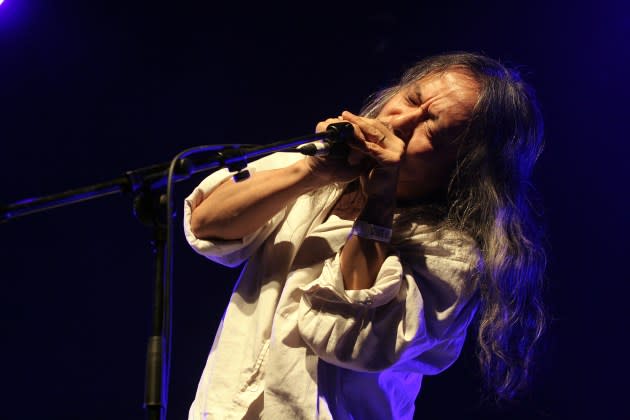Can Vocalist Damo Suzuki Dies at 74

Damo Suzuki, the Japanese lead singer of the wildly innovative band Can, has died, according to a statement from the band’s social media accounts. No cause of death was cited, although he had been battling colon cancer for a decade; he was 74.
“It is with great sadness that we have to announce the passing of our wonderful friend Damo Suzuki, yesterday, Friday 9th February 2024,” the statement reads. “His boundless creative energy has touched so many over the whole world, not just with Can, but also with his all continent spanning Network Tour. Damo’s kind soul and cheeky smile will be forever missed.
“He will be joining Michael, Jaki and Holger for a fantastic jam!,” the note concludes, along with a message of love to his family, referencing deceased fellow Can members Michael Karoli (guitar), Jaki Liebezeit (drums), and Holger Czukay (bass and electronics).
Along with Kraftwerk, Neu and others, Can was a leader of the innovative and experimental coterie of German groups that arose in the wake of psychedelia in the late 1960s, loosely grouped under the “Krautrock” tag. While the groups began at a similar starting point and even shared some members, they quickly branched into wildly diverging directions, with Can pursuing a more organic and improvisatory path than the others.
The group’s original singer, Michael Mooney, had left after the 1969 release of its debut album, “Monster Movie”; Suzuki, who had left Japan as a teenager to travel in Europe, was busking on a street in Munich when Liebezeit and Czukay asked him to join the group onstage that night. He officially joined in 1970 and worked with the group on its best-known and most influential albums: “Soundtracks,” 1971’s “Tago Mago,” 1972’s “Ege Bamyasi” and 1973’s “Future Days. His unstructured singing style, impressionistic lyrics and often invented words fit in smoothly with the group’s improvisations, which could stretch on for dozens of minutes; the full version of their 1970 classic “Mother Sky” clocks in at nearly half an hour.
Suzuki left the group after the release of “Future Days,” marrying a German woman who was a Jehovah’s Witness and focusing on the religion’s practice over the following decade. He returned to music in 1983 and released a series of solo projects and toured over the years, although his illness impaired his abilities in recent years. He never again performed with Can, which recorded a series of albums without replacing him after his departure. The group has been releasing a series of archival live recordings in recent years, several of which feature Suzuki.
Best of Variety
Sign up for Variety’s Newsletter. For the latest news, follow us on Facebook, Twitter, and Instagram.

